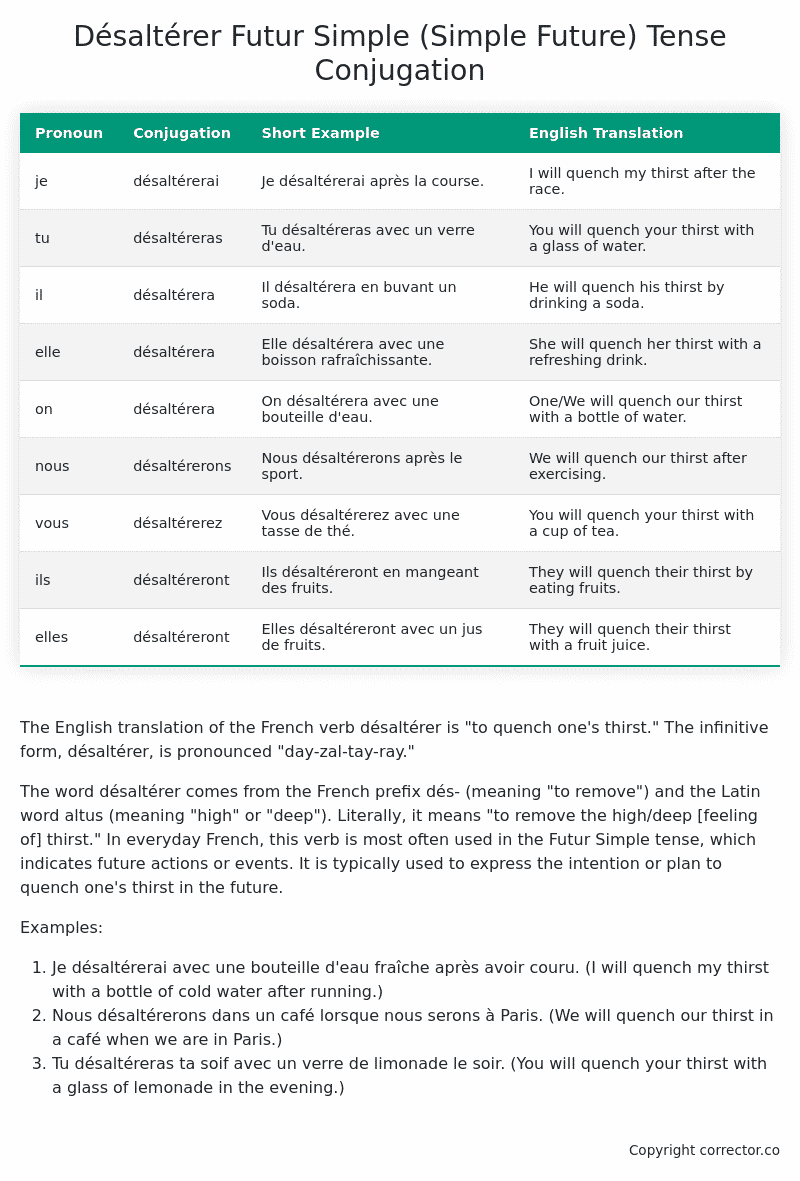Futur Simple (Simple Future) Tense Conjugation of the French Verb désaltérer
Introduction to the verb désaltérer
The English translation of the French verb désaltérer is “to quench one’s thirst.” The infinitive form, désaltérer, is pronounced “day-zal-tay-ray.”
The word désaltérer comes from the French prefix dés- (meaning “to remove”) and the Latin word altus (meaning “high” or “deep”). Literally, it means “to remove the high/deep [feeling of] thirst.” In everyday French, this verb is most often used in the Futur Simple tense, which indicates future actions or events. It is typically used to express the intention or plan to quench one’s thirst in the future.
Examples:
- Je désaltérerai avec une bouteille d’eau fraîche après avoir couru. (I will quench my thirst with a bottle of cold water after running.)
- Nous désaltérerons dans un café lorsque nous serons à Paris. (We will quench our thirst in a café when we are in Paris.)
- Tu désaltéreras ta soif avec un verre de limonade le soir. (You will quench your thirst with a glass of lemonade in the evening.)
Table of the Futur Simple (Simple Future) Tense Conjugation of désaltérer
| Pronoun | Conjugation | Short Example | English Translation |
|---|---|---|---|
| je | désaltérerai | Je désaltérerai après la course. | I will quench my thirst after the race. |
| tu | désaltéreras | Tu désaltéreras avec un verre d’eau. | You will quench your thirst with a glass of water. |
| il | désaltérera | Il désaltérera en buvant un soda. | He will quench his thirst by drinking a soda. |
| elle | désaltérera | Elle désaltérera avec une boisson rafraîchissante. | She will quench her thirst with a refreshing drink. |
| on | désaltérera | On désaltérera avec une bouteille d’eau. | One/We will quench our thirst with a bottle of water. |
| nous | désaltérerons | Nous désaltérerons après le sport. | We will quench our thirst after exercising. |
| vous | désaltérerez | Vous désaltérerez avec une tasse de thé. | You will quench your thirst with a cup of tea. |
| ils | désaltéreront | Ils désaltéreront en mangeant des fruits. | They will quench their thirst by eating fruits. |
| elles | désaltéreront | Elles désaltéreront avec un jus de fruits. | They will quench their thirst with a fruit juice. |
Other Conjugations for Désaltérer.
Le Present (Present Tense) Conjugation of the French Verb désaltérer
Imparfait (Imperfect) Tense Conjugation of the French Verb désaltérer
Passé Simple (Simple Past) Tense Conjugation of the French Verb désaltérer
Passé Composé (Present Perfect) Tense Conjugation of the French Verb désaltérer
Futur Simple (Simple Future) Tense Conjugation of the French Verb désaltérer (this article)
Futur Proche (Near Future) Tense Conjugation of the French Verb désaltérer
Plus-que-parfait (Pluperfect) Tense Conjugation of the French Verb désaltérer
Passé Antérieur (Past Anterior) Tense Conjugation of the French Verb désaltérer
Futur Antérieur (Future Anterior) Tense Conjugation of the French Verb désaltérer
Subjonctif Présent (Subjunctive Present) Tense Conjugation of the French Verb désaltérer
Subjonctif Passé (Subjunctive Past) Tense Conjugation of the French Verb désaltérer
Subjonctif Imparfait (Subjunctive Imperfect) Tense Conjugation of the French Verb désaltérer
Subjonctif Plus-que-parfait (Subjunctive Pluperfect) Tense Conjugation of the French Verb désaltérer
Conditionnel Présent (Conditional Present) Tense Conjugation of the French Verb désaltérer
Conditionnel Passé (Conditional Past) Tense Conjugation of the French Verb désaltérer
L’impératif Présent (Imperative Present) Tense Conjugation of the French Verb désaltérer
L’infinitif Présent (Infinitive Present) Tense Conjugation of the French Verb désaltérer
Struggling with French verbs or the language in general? Why not use our free French Grammar Checker – no registration required!
Get a FREE Download Study Sheet of this Conjugation 🔥
Simply right click the image below, click “save image” and get your free reference for the désaltérer Futur Simple tense conjugation!

Désaltérer – About the French Futur Simple (Simple Future) Tense
Formation of Futur Simple
For regular -er verbs (e.g., parler – to speak)
For regular -ir verbs (e.g., finir – to finish)
For regular -re verbs (e.g., vendre – to sell)
Common Everyday Usage Patterns
Conditional Statements
Interactions with Other Tenses
Futur Antérieur
Conditional
Present
Summary
I hope you enjoyed this article on the verb désaltérer. Still in a learning mood? Check out another TOTALLY random French verb conjugation!


